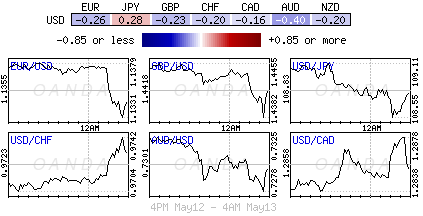Who is Kevin Hassett? Wolfe looks at the Trump ally tipped to become Fed Chair.
Friday May 13: Five things the markets are talking about.
A week of consolidated trading is finally coming to an end. It has been difficult for speculators without much market guidance.
This week in particular, trading sentiment has been ‘to-and-fro’ due to a lack of market conviction as to whether the sub-par global economic growth scenario is positive or negative for the ‘big” dollar.
Overnight, the dollar found some traction on Fed rate normalization talk, one day after sustaining broad losses on the back of a disappointing U.S weekly claims print.
Investors get to close out this week by getting another look at the U.S economy. The focus is on the U.S consumer as we get retail sales data for April and the preliminary University of Michigan consumer sentiment survey for May in a few hours.
1. Market, not Fed, caught behind the curve
The USD is being aided by continued Fed speak of the need for gradual rate normalization and safe-haven flows on continued risk aversion sentiment.
Less dovish Fed-speak late Thursday from Rosengren (Boston) and Mester (Cleveland) stressed that markets are “underpricing expectations” of further Fed hikes this year.
With rate differential premium supposedly in play again, it was only natural that the ‘big’ dollar would see some support overnight, but thus far, it’s well contained (€1.1332, £1.4402, A$0.7282, C$1.2872)
Rosengren endorsed more hikes, stating that early Q2 data is consistent with inflation closer to their desired +2% target, while Mester also noted that U.S inflation is rising towards the Fed’s desired levels.
Fed fund futures would suggest that the market is not convinced of a Fed rates backing up any time soon.
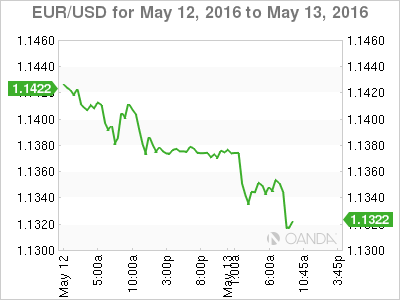
2. Asian investors not convinced of a Fed hike either
This week saw a record demand for U.S debt product. The globe is scouring the world for a return now that Central Banks are playing with negative interest rate policies (NIRP).
Japanese investors remain a big fan of U.S Treasury bonds. Institutional investors from Japan helped drive the record +73.5% indirect bidding on Wednesday’ 10-year auction (yield +1.714%).
Their hunger for positives returns occurred as the dollar (¥108.65) regained strength against the yen. The yen’s rally this year does not seem to be dissuading Asian to turn away from U.S assets.
This would indicate that the rest of the world is starving for high-quality bonds with positive yields. If the market really believes the Fed to be very slow in raising rates are +1.50% U.S 10-year yields on the cards?
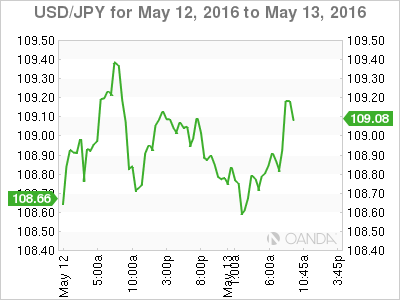
3. U.S weekly claims at 15-month high
The market seems to have dismissed last week’s disappointing U.S weekly claims with ease, and this despite it being a new 15-month record. Why? Everyone is happy to blame the “cable company”.
The +20k rise in jobless claims (+294k vs. +274k) was largely driven by a jump from one state, New York.
Analysts are blaming the U.S national increase on that sate’s Verizon worker strike. Verizon’s workers walkout began in mid-April and New York provides jobless benefits once an employer “hires permanent replacement workers.” Verizon had reportedly had done this during the past two-weeks.
Analysts also not that absent the Empire State’s numbers – initial claims remains at historically low levels. This would suggest that the Fed Chair Yellen and company do not have to worry about the U.S jobs situation any time soon and not even after a headline miss in last week’s non-farm payroll (NFP) print (+160k vs. +200k).
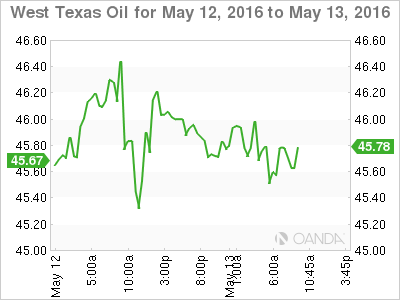
4. Carney faces Brexit barrage on Super Thursday
Bank of England’s (BoE) Governor Carney did not hold back yesterday on the risks to the U.K. economy over Brexit. A vote to leave could lead to a “materially lower path for growth and a notably higher path for inflation”, sterling might fall “sharply” and BoE policy makers would face a “challenging trade-off.” In translation, the U.K would be facing a recession.
While promising to act accordingly, Carney reminded investors that monetary policy alone cannot offset all the effects of a shock to the U.K economy.
The IMF seems to be in agreement with the Governor. This morning the pound is trying to push lower (£1.4404) after the IMF warned that a U.K. vote to exit the EU in a June 23 referendum could hurt the economy, causing it to shrink by between -1% and -9% over the long-term.
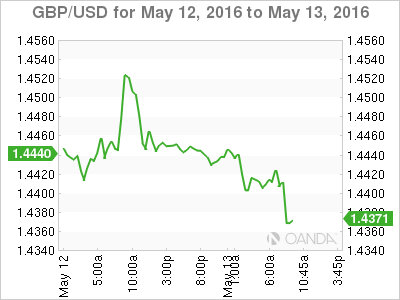
5. Global bourses are on the back foot
Global stocks see read while gold ($1,275) and the yen (¥108.65) have strengthened as investors turned cautious ahead of today’s U.S data.
Another day of downbeat earnings reports from major U.S. retailers yesterday is keeping U.S. bourses relatively subdued this week. Can things turn around with todays U.S. retail sales print?
In commodities, Brent crude oil was down -0.7% at $47.75 a barrel and West Texas -1.6% to $45.93.
Indices: Stoxx50 -0.7% at 2,914, FTSE -0.7% at 6,061, DAX -0.6% at 9,805, CAC-40 -0.7% at 4,264, IBEX-35 -0.5% at 8,621, FTSE MIB -0.9% at 17,499, SMI -0.6% at 7,837, S&P 500 Futures -0.4%
